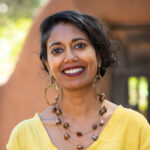Postponed until next year
Muslim France and the Contradictions of Laïcité: A History of the Present
Mayanthi Fernando, University of California Santa Cruz
In 1989 three Muslim schoolgirls from a Paris suburb refused to remove their Islamic headscarves in class, igniting a debate – still raging more than 30 years later – about the place of Muslims in the French Republic and within its governing framework of laïcité (secularism). The dominant narrative about laïcité, both in France and in the US media, is that in 1905, France separated church and state, and religion was restricted to the private sphere. Public Muslimness is therefore seen as contravening this longstanding arrangement of what it means to be French.
Mayanthi Fernando will complicate that narrative to offer a different history of the present. First, she will show how laïcité has entailed not the separation of religion from politics and the public sphere but rather the French state’s intervention into religious life, including defining what counts as religion, belief, practice, symbol, and so on, using a Christian framework to make those distinctions. Fernando will then delve more deeply into the headscarf drama. The language of the 2004 law banning “conspicuous religious signs” classifies the headscarf as a sign or symbol of Islamic identity. As a result, the headscarf falls outside protection granted under the aegis of religious freedom, which distinguishes between the right to belief, which is inalienable, and the right to manifest that belief, which can be restricted for reasons of public order. This contemporary legal distinction can be traced to an older Protestant division between internal belief (thought to be primary) and external practice (thought to be secondary to belief). In other words, what we find in France is a Muslim French community consistently caught within the internal contradictions of secularism, which insists on separating religion from politics yet is built on their entanglement.
This program is sponsored by the Clarke Forum for Contemporary Issues and co-sponsored by the Popel Shaw Center for Race & Ethnicity, the Women’s & Gender Resource Center, the departments of women’s, gender & sexuality studies, Africana studies, international studies, sociology, French & Francophone studies, the Middle East studies program, the Center for Sustainability Education and the Center for Spirituality & Social Justice. In addition, this program was initiated by the Clarke Forum’s student project managers.
Biography (provided by the speaker)
 Mayanthi Fernando is professor of anthropology at UC Santa Cruz and provost of Kresge College, a living-learning community for UCSC’s undergraduate students. She has also taught at UC Berkeley, Wesleyan University, Washington University in St. Louis, and the City College of New York. She received her Ph.D. from the University of Chicago and her B.A. from Harvard. Her research interests include Islam and secularism; human-nonhuman entanglements; more-than-secular multispecies ecologies; histories of the body and consciousness; liberalism and law; and gender and sexuality. She is the author of The Republic Unsettled: Muslim French and the Contradictions of Secularism (Duke, 2014) and co-editor of Trouillot Remixed: The Michel-Rolph Trouillot Reader (Duke, 2021. She is currently working on a second book, Companion Spirits: Beyond the Anthroposecular, on secularity and the Anthropocene. She has held residential fellowships at the Institute for Advanced Study in Princeton, the School for Advanced Research in Santa Fe, and the Museum of World Cultures in Leiden, and has published in a wide array of academic journals in anthropology, religious studies, gender studies, and critical theory, as well as in public-facing venues in the United States and Europe.
Mayanthi Fernando is professor of anthropology at UC Santa Cruz and provost of Kresge College, a living-learning community for UCSC’s undergraduate students. She has also taught at UC Berkeley, Wesleyan University, Washington University in St. Louis, and the City College of New York. She received her Ph.D. from the University of Chicago and her B.A. from Harvard. Her research interests include Islam and secularism; human-nonhuman entanglements; more-than-secular multispecies ecologies; histories of the body and consciousness; liberalism and law; and gender and sexuality. She is the author of The Republic Unsettled: Muslim French and the Contradictions of Secularism (Duke, 2014) and co-editor of Trouillot Remixed: The Michel-Rolph Trouillot Reader (Duke, 2021. She is currently working on a second book, Companion Spirits: Beyond the Anthroposecular, on secularity and the Anthropocene. She has held residential fellowships at the Institute for Advanced Study in Princeton, the School for Advanced Research in Santa Fe, and the Museum of World Cultures in Leiden, and has published in a wide array of academic journals in anthropology, religious studies, gender studies, and critical theory, as well as in public-facing venues in the United States and Europe.
Related Links
Liberté, Egalité, Féminisme? – Dissent Magazine
Berkley Forum – Rinse and Repeat: French Secularism as Political Theater
